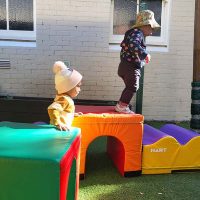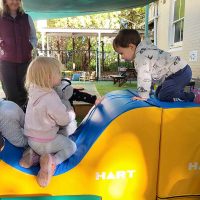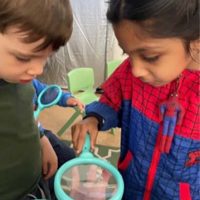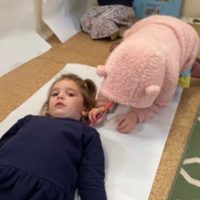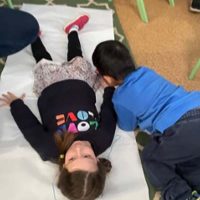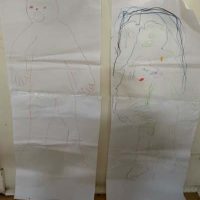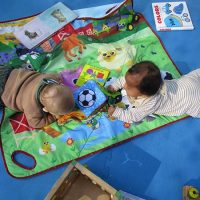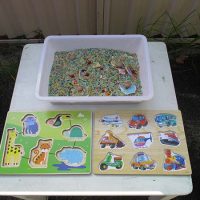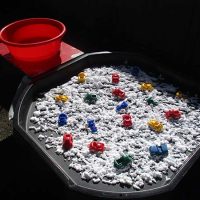Gorton House
Toddlers
Story by Educator Russell
The very curious and very keen for deviation from the norm Gorton House toddlers have been embracing opportunities to get out and about to explore the wonderful grounds we have at our disposal.
The toddlers’ Educator team have decided to expand curious minds and probe new learning opportunities by taking the children on regular walks around The Infants’ Home with the aim of creating opportunities to expand social circles and make new friends based around shared or arising interests. These walks also provide the basis for future socio-dramatic play, allow us to explore art through nature, and are a great way to generate conversations we might not normally have in the room on a daily basis. Last week the first of these new walks ended up turning into a bit of a nature scavenger hunt, with the children gathering interestingly shaped branches, flowers and many small, differently shaped rocks, which all ended up being used as ingredients for pretend cooking in home corner.
The flowers proved to be of particular interest, with two of the children gathering them off the ground in abundance. When I asked what they were going to use them for, the reply came “Well, we’re getting married, and you need flowers at your wedding”. When questioned further about the wedding, it was revealed that no-one else at Gorton House was invited and that “just our mums and dads” were allowed to go. It was interesting linking this back to recent group time discussions about emotions and what makes us happy/sad/ jealous etc.
It will be interesting to see where we might end up and in what direction these walks might take us. Stay tuned.
Johnson House
Toddlers
Story by Senior Occupational Therapist Justine
The children in Johnson House toddlers have been working on their gross motor skills. Using some soft play equipment, the children have been climbing, balancing, sliding, stepping and crawling their way around an obstacle course.
Often overlooked, gross motor skills heavily influence other everyday tasks. For example, a child’s ability to maintain appropriate table-top posture (upper body support) will affect their ability to participate in fine motor skills (for example, drawing and cutting) and sitting upright to attend to instruction, which then impacts on their educational learning.
Robinson House
Story by Occupational Therapist Lisa
Sensory Detectives Integrated Group
Today was the first day of our Sensory Detectives group! We started our group off by saying hello and checking our names in—everyone was very excited for our new group!
The focus of our group is to explore the sense of ‘interoception’. What is ‘interoception’ you ask? It’s the mysterious eighth sense! The unique job of our interoception system is to enable us to feel the internal sensations in of our bodies. Clearly noticing and understanding body signals helps us to identify exactly how we feel. For example, before speaking in a room full of people, you may notice your heartbeat increase, your muscles tense and your stomach flutter. Understanding these body signals lets us know that we are nervous, or maybe even excited.
For each week of this group, we are going to be exploring a different part of our body and supporting children to use simple mindfulness techniques and ‘experiments’ to practice tuning in to that body part.
Today, we started with our hands and fingers. We first used magnifying glasses to explore what our hands look like. Eric noticed some spots, whilst Ayat noticed a ring on my hand. We also talked about different words that could describe how our hands could feel. Some of the suggestions were “fire”, “cold”, “slimy”, and “wet”. The next part of our group was to engage in some ‘experiments’ using our hands. We explored some squeezy gel balls, squeezing our hands really tight for ten seconds and then letting go, blowing puffs of air onto our hands, feeling some warm ‘pocket warmers’, and exploring the slimy feeling of sorbelene cream.
For the final part of group, we created a ‘body map’ of each child by tracing around their body onto a sheet of paper. Each week we will use the outline of their body to reflect on the body part we explored that week, as well as the body parts that we have previously explored.
By helping children to ‘tune in’ to their body through play when they are calm, we can help them to build stronger connections with the feelings within their body. This is an important building block to supporting children to link the feelings within their body with respective emotions, and to therefore begin building self-regulation skills.
Community Playgroups
Story by Playgroup Coordinator Rebecca
This week at playgroups we have been looking at sensory play and how this helps our children develop. There are many activities that can be done at home that constitute sensory play. Playing with ice cubes in a tray, soapy water and washing toys, sandpits, shaving cream and rice are just a few ideas.
We understand that setting up messy play can sometimes be a bit be hard and inconvenient, but what are the benefits of sensory play? What can our children learn from the opportunity to engage all of their senses?
Research has shown that children learn best when all their senses are engaged. Seeing, hearing, touching, tasting and smelling are all ways that children learn to think about, feel and compare things within their environment. Sensory play encourages learning through exploration, curiosity, problem solving and creativity and helps to build connections within the brain. Through sensory play, our children learn skills that they will take forward with them when they are ready to use a pencil or a crayon, when they want to use scissors, use a knife and fork or tie their shoelaces. Opportunities to develop language is also immense, especially the use of descriptive language as they describe what they may be seeing, smelling, hearing, touching or tasting during their play. These are the reasons why we do so much sensory play at playgroup!
